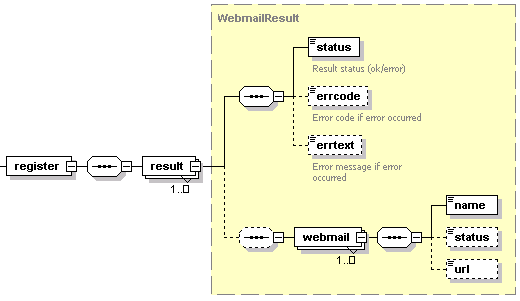Enabling a Webmail Service
The enable operation is used to make a webmail services available for selection in hosting plan settings.
Request Packet Structure
A request XML packet making a webmail services available for selection in hosting plan settings includes the enable operation node:
<packet version="1.6.3.1">
<webmail>
<enable>
...
</enable>
</webmail>
</packet>
The enable node is presented by type UnRegisterInputType
(webmail.xsd). Its graphical representation is as follows:

Note: The interactive schema navigator for all request packets is available here: http://plesk.github.io/api-schemas/1.6.8.0/agent_input.svg.
- The filter node is required. It specifies the criteria by which the necessary webmail service will be selected from the database.
- The name node is required. It specifies the webmail service name. Data type: string.
Response Packet Structure
The enable node of the output XML packet is structured as follows:

Note: The interactive schema navigator for all response packets is available here: http://plesk.github.io/api-schemas/1.6.8.0/agent_output.svg.
- The result node is required. It wraps the information about the
operation execution and the list of webmail services. Data type:
WebmailResult (
webmail.xsd). - The status node is required. It specifies the execution status of the operation. Data type: result_status (string). Allowed values: ok | error.
- The errcode node is optional. It returns the error code. Data type: unsignedInt.
- The errtext node is optional. It returns the error message. Data type: string.
- The webmail node is required. It wraps the webmail service parameters.
- The name node is required. It specifies the webmail service name. Data type: string.
- The status node is optional. It specifies the webmail service status. Data type: string.
- The url node is required. It specifies the webmail service URL. Data type: string.
Samples
This packet enables an external webmail service Horde:
<packet>
<webmail>
<enable>
<filter>
<name>Horde</name>
</filter>
</enable>
</webmail>
</packet>
Response:
<packet>
<webmail>
<enable>
<result>
<status>ok</status>
<webmail>
<name>Horde</name>
<status>true</status>
<url>http://example.com</url>
</webmail>
</result>
</enable>
</webmail>
</packet>